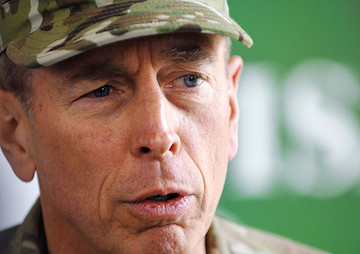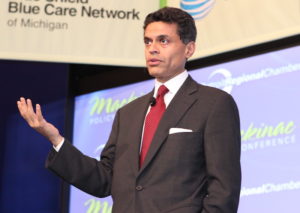Leaker, Speaker, Soldier, Spy: The Charmed Life of David Petraeus
It seems a robust Rolodex with the right global roster, a marquee name and a cultivated geopolitical brand covers a multitude of sins. And that’s precisely the type of firepower that Petraeus brings to the table. David Petraeus. (ResoluteSupportMedia / CC-BY-2.0)
1
2
3
4
David Petraeus. (ResoluteSupportMedia / CC-BY-2.0)
1
2
3
4
And win Petraeus did. Not in Afghanistan, of course. That war grinds on without end. But the Teflon general somehow emerged from it all with people talking about him as a future presidential contender. Looking back at Petraeus’s successes, one understands just what a feat this was. Statistics show that Petraeus never actually pacified Mosul, which has now been under the control of the Islamic State (ISIS) for years. The army Petraeus helped build in Iraq crumbled in the face of that same force which, in some cases, was even supported by Sunni fighters Petraeus had put on the U.S. payroll to make The Surge appear successful.
Indeed, Petraeus had come to New America’s New York headquarters to answer one question in particular: “What will the next president’s national security challenges be?” Al-Qaeda, the Taliban, ISIS, Iraq, Afghanistan: precisely the set of groups he had fought, places he had fought in, or what had resulted from his supposed victories.
Retired Brass, Then and Now
“What can you do with a general, when he stops being a general? Oh, what can you do with a general who retires?”
Irving Berlin first posed these questions in 1948 and Bing Crosby crooned them six years later in White Christmas, the lavish Hollywood musical that has become a holiday season staple.
These are not, however, questions which seem to have plagued David Petraeus. He retired from the Army in 2011 to take a job as director of the CIA, only to resign in disgrace a year later when it was revealed that he had leaked classified information to his biographer and one-time lover Paula Broadwell and then lied about it to the FBI. Thanks to a deal with federal prosecutors, Petraeus pled guilty to just a single misdemeanor and served no jail time, allowing him, as the New York Times reported last year, “to focus on his lucrative post-government career as a partner in a private equity firm and a worldwide speaker on national security issues.”
In the Bing and Berlin era, following back-to-back victories in world wars, things were different. Take George C. Marshall, a five-star general and the most important U.S. military leader during World War II who is best remembered today for the post-war European recovery plan that bore his name. Fellow five-star general and later president Dwight Eisenhower recalled that, during the Second World War, Marshall “did not want to sit in Washington and be a chief of staff. I am sure he wanted a field command, but he wouldn’t even allow his chief [President Franklin Roosevelt] to know what he wanted, because he said, ‘I am here to serve and not to satisfy personal ambition.’” That mindset seemed to remain his guiding directive after he retired in 1945 and went on to serve as a special envoy to China, secretary of state, and secretary of defense.
Marshall reportedly refused a number of lucrative offers to write his memoirs, including the then-princely sum of a million dollars after taxes from Time and Life publisher Henry Luce. He did so on the grounds that it was unethical to profit from service to the United States or to benefit from the sacrifices of the men who had served under him, supposedly telling one publisher “that he had not spent his life serving the government in order to sell his life story to the Saturday Evening Post.” In his last years, he finally cooperated with a biographer and gave his archives to the George C. Marshall Research Foundation on “the condition that no monetary returns from a book or books based on his materials would go to him or his family but would be used for the research program of the Marshall Foundation.” Even his biographer was asked to “waive the right to any royalties from the biography.” Marshall also declined to serve on any corporate boards.
Dig, Root, GrowThis year, we’re all on shaky ground, and the need for independent journalism has never been greater. A new administration is openly attacking free press — and the stakes couldn’t be higher.
Your support is more than a donation. It helps us dig deeper into hidden truths, root out corruption and misinformation, and grow an informed, resilient community.
Independent journalism like Truthdig doesn't just report the news — it helps cultivate a better future.
Your tax-deductible gift powers fearless reporting and uncompromising analysis. Together, we can protect democracy and expose the stories that must be told.
This spring, stand with our journalists.
Dig. Root. Grow. Cultivate a better future.
Donate today.








You need to be a supporter to comment.
There are currently no responses to this article.
Be the first to respond.